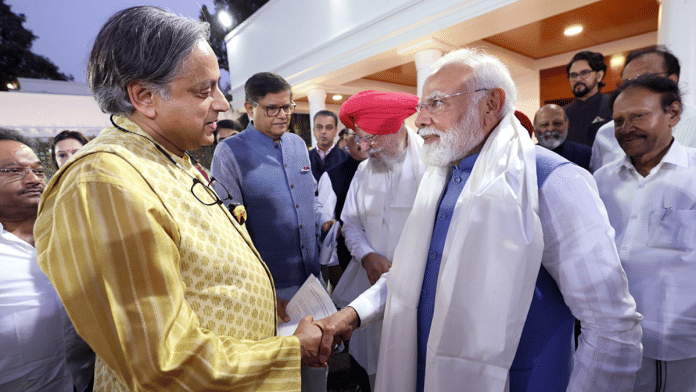Thiruvananthapuram: After a brief hiatus, senior Congress leader Shashi Tharoor has once again sparked controversy with his comments on dynastic politics and the remark that “the influence of the Nehru-Gandhi dynasty… has cemented the idea that political leadership can be a birthright”.
In a recent article published in Project Syndicate, Shashi Tharoor wrote that a single family has dominated India’s political landscape for generations. The Malayalam version of the opinion piece, originally published on the platform on 31 October, appeared in the Kerala daily Mangalam on Sunday.
“The influence of the Nehru-Gandhi dynasty, including India’s first prime minister, Jawaharlal Nehru, prime ministers Indira Gandhi and Rajiv Gandhi, and current opposition leader Rahul Gandhi and MP Priyanka Gandhi Vadra, is bound up with the history of India’s struggle for freedom. But it has also cemented the idea that political leadership can be a birthright,” Tharoor wrote, adding that the belief has penetrated Indian politics across every party, in every region, and at every level.
Shashi Tharoor went on to cite examples such as the rise of the Biju Janata Dal in Odisha under Naveen Patnaik, following in the footsteps of his father Biju Patnaik; the Thackeray family’s influence in Maharashtra politics from Shiv Sena founder Bal Thackeray to Aditya Thackeray; the Samajwadi Party in Uttar Pradesh, where Mulayam Singh Yadav handed the reins to his son Akhilesh; and in Jammu and Kashmir, where the Abdullah and Mufti families continue to shape politics. He also pointed to Tamil Nadu, where Karunanidhi’s family controls the DMK.
The Congress MP, who has represented the Thiruvananthapuram Lok Sabha constituency since 2019, has often made statements that are seen to be controversial since his views are often divergent from his party’s stance.
His repeated praise of the Narendra Modi government and its policies, including ‘Operation Sindoor’ has raised eyebrows among his colleagues in Delhi, while his appreciation of the LDF government’s efforts to attract investments created friction within the Kerala Congress. Notably, Shashi Tharoor was the only UDF MP absent from the party’s campaign during the Nilambur bypoll, which saw the participation of Wayanad MP Priyanka Gandhi.
However, Shashi Tharoor later attended a Congress political affairs committee meeting in Thiruvananthapuram in early October along with KPCC chief Sunny Joseph and other Kerala leaders, hinting at a possible reconciliation with the party. The latest controversy also comes barely a month before local body polls in Kerala, and months before the state Assembly polls.
Congress leaders in Kerala have not yet responded to the article. When asked about it, Leader of Opposition V.D. Satheesan declined a comment.
Privilege versus merit: Tharoor’s perspective
According to the Congress MP, dynastic politics is not limited to India, but runs deep in the Indian sub-continent as a whole, including the Sharifs in Pakistan to Rajapaksas in Sri Lanka.
“This phenomenon is not limited to a handful of prominent families; rather, it is woven deeply into the fabric of Indian governance, from village councils to the highest echelons of parliament,” Tharoor wrote, citing multiple studies that show how family lineage runs deep in Indian politics.
Tharoor observed that leaders with ‘built-in name recognition’ may not have to work as hard to gain voters’ trust, adding that it continues as many parties remain personality-driven with opaque leadership selection processes, allowing nepotism to thrive, when these advantages should have faded over time. He further argued that “dynastic families” enjoy access to a “ready-made election machinery” of donors, workers, and local enforcers, compared to political newcomers.
In conclusion, Tharoor stated that dynastic politics weakened Indian democracy by undermining governance, reducing representation, and competence.
“Drawing from a smaller talent pool is never advantageous, but it is especially problematic when candidates’ main qualification is their surname,” he says, adding that such leaders are often detached from ordinary people’s struggles, and might be ill-equipped to meet their constituents’ needs.
“It is high time India traded dynasty for meritocracy. This would require fundamental reforms, from imposing legally mandated term limits to ensuring meaningful internal party elections, along with efforts to educate and empower voters to choose leaders based on merit,” he said.
(Edited by Viny Mishra)
Also read: Emergency column puts Tharoor in firing line. Congress says ‘decide which party you belong to’






